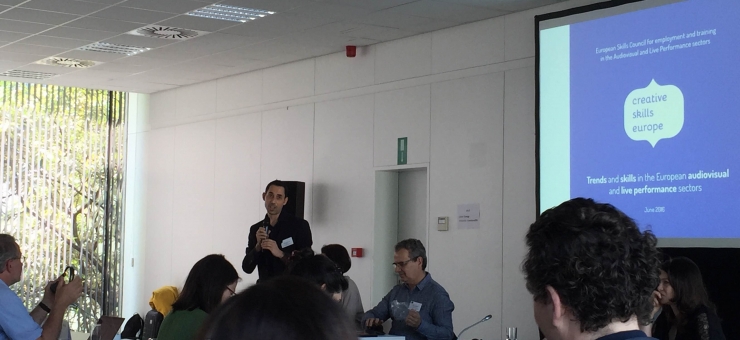News
Creative Skills Europe launches final report

Today, the final conference of the Creative Skills Europe project takes place. Creative Skills Europe is the European Skills Council for employment and training in the Audiovisual and Live Performance sectors.The project partners have launched the final report Trends and skills in the European audiovisual and live performance sectors at the conference.
Richard Polacek from EURO-MEI (media, entertainment and arts sector of UNI Europa) highlighted the productive collaboration of all project partners involved: ‘It is quite an achievement that everyone in the sector worked together in such depth and with such efficiency – I hope we can use the findings and recommendations the we jointly created to address the challenges the audiovisual and live performance sector will face in the years to come.’
The project partners have collected and shared sector labour market intelligence gathered from different EU countries with the aim to anticipate change and better prepare for the future. The project was also designed to promote peer learning and the exchange of best practice across EU borders. And, most importantly, it identified trends and skills to formulate recommendations for the sector.
Key recommendations are
1. Collecting the right data for market intelligence
Sectoral stakeholders and policy makers need to access reliable and stable national data in order to monitor developments in the audiovisual and live performance markets. They have to understand the deeper trends, be better at anticipating future conditions, and then be capable of adapting the skills of the workforce accordingly. In addition, more detailed pan-European data must be collected, including on employment mobility (sectoral and transnational).
2. Setting up informed and sustainable sector platforms
Platforms should be set up, at national and EU levels, composed of the relevant representatives of sector stakeholders (employers, unions, national skills bodies, professional associations, education and training organisations) to develop analytical studies of the data gathered, and open up possibilities for practical decision-making that will respond to sectoral needs.
3. Responding to the digital shift
The new digital environment, with its constantly evolving technological advances, has operated a thorough transformation of the creative and cultural industry, affecting production and distribution channels, performances and publicity, and has also made content creation far more important. EU funding programmes and national funding policies must be made compatible with the needs of skills development in the audiovisual and live performance sectors, going well beyond basic ICT skills and recognising the role of creative stakeholders in content creation and innovation.
Visit the project website creativeskillseurope.eu where you can also find the full report or read the executive summary on trends and skills in the European audiovisual and live performance sectors.
What is Creative Skills Europe? The European Skills Council for employment and training in the Audiovisual and Live Performance sectors, is a joint project launched in 2014 by a partnership of European trade unions and employers’ organisations and piloted by social partners of the EU Social Dialogue Committees in the Audiovisual and Live Performance Sectors: EURO-MEI (media, entertainment and arts sector of UNI Europa), International Federation of Actors (FIA), International Federation of Musicians (FIM), European Federation of Journalists (EFJ), European Broadcasting Union (EBU), Performing Arts Employers’ Associations League Europe (PEARLE), European Coordination of Independent Producers (CEPI).

